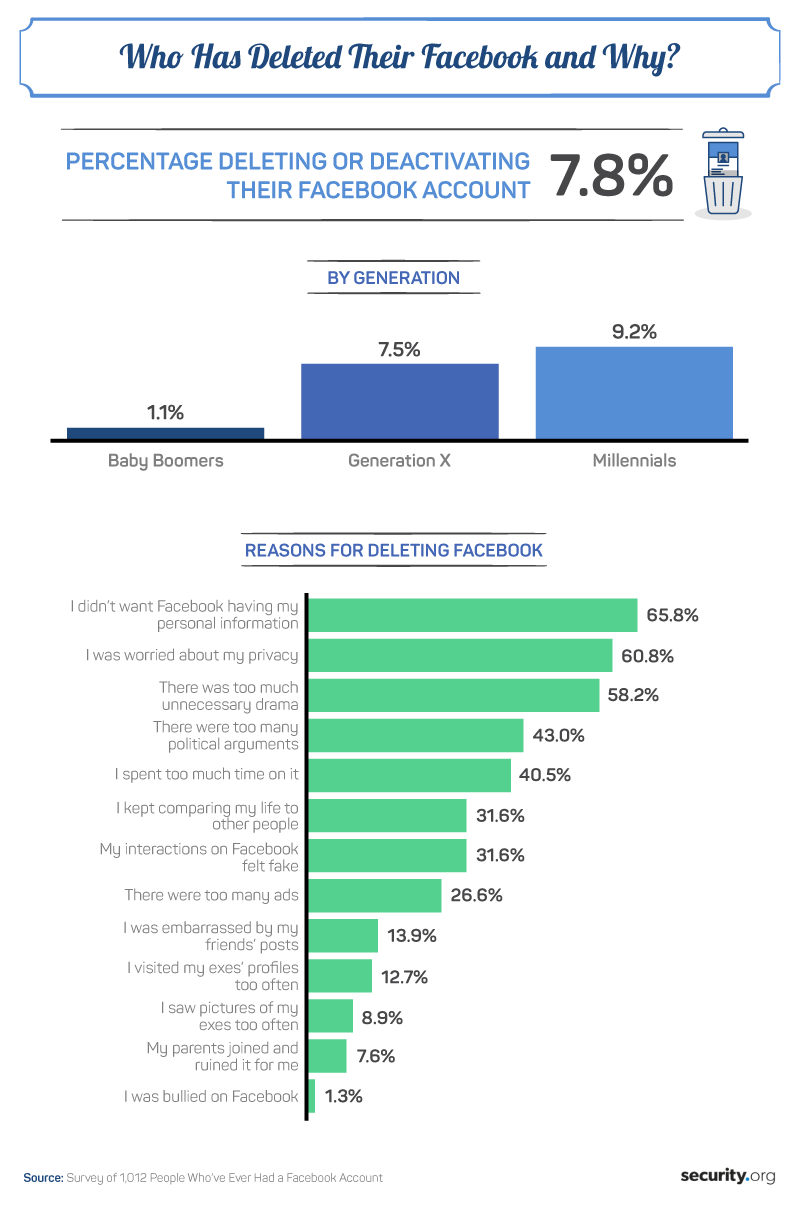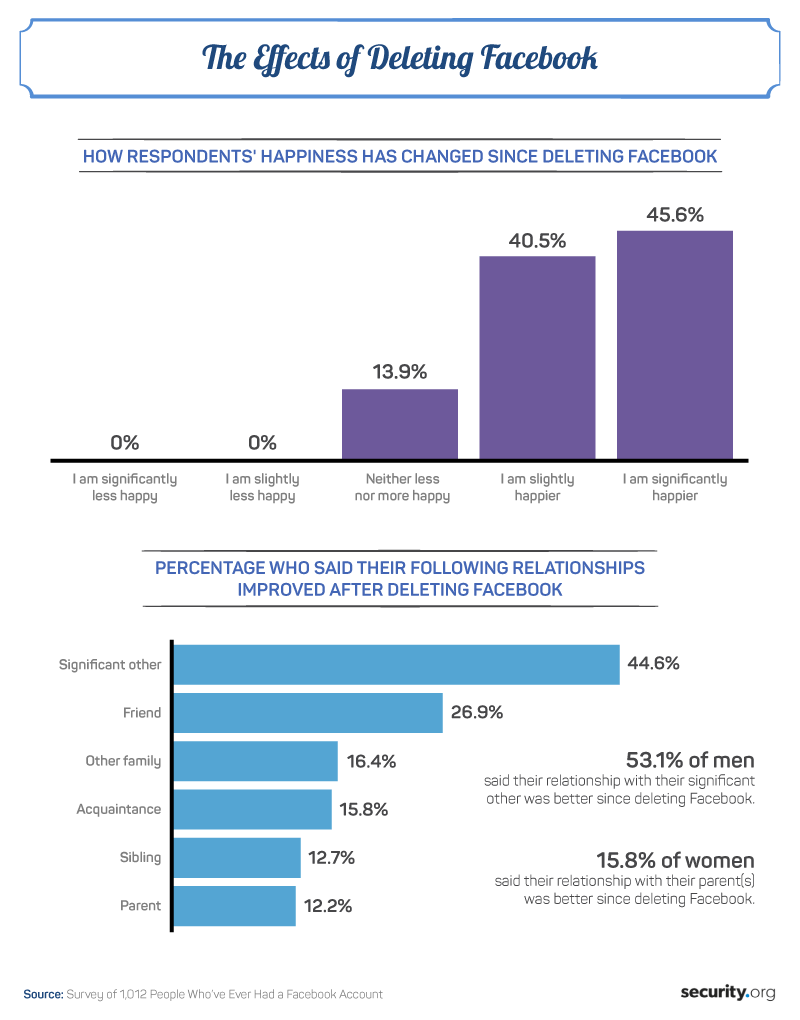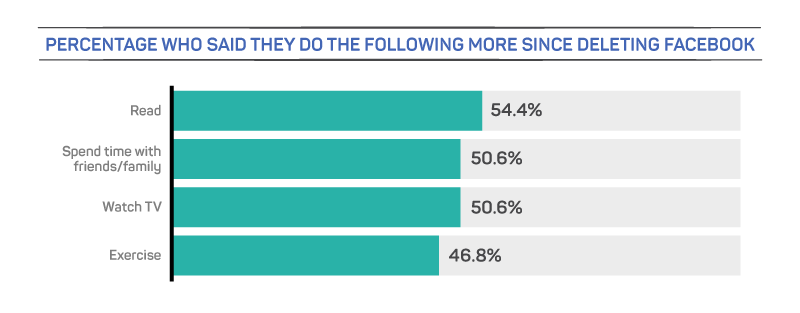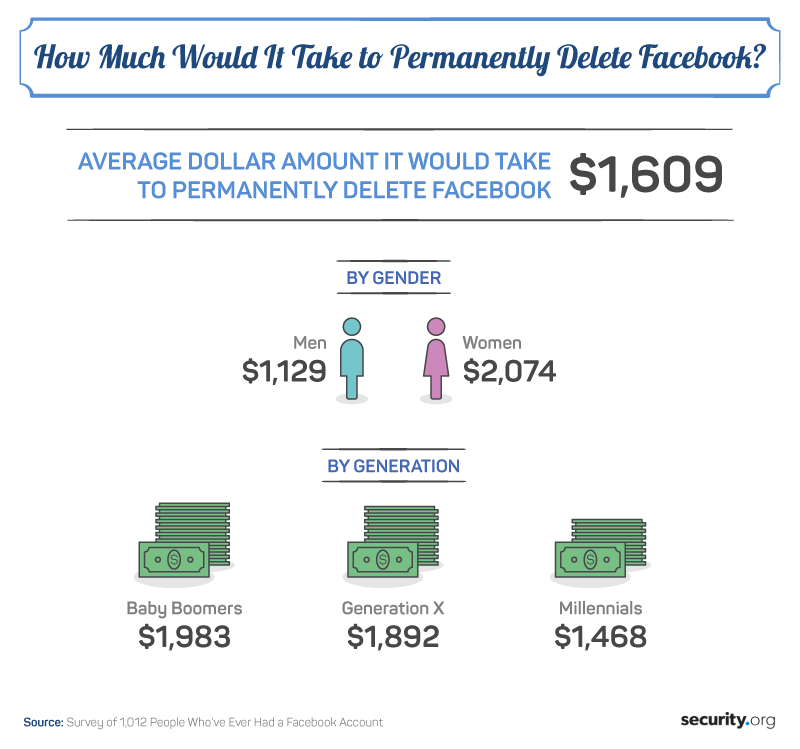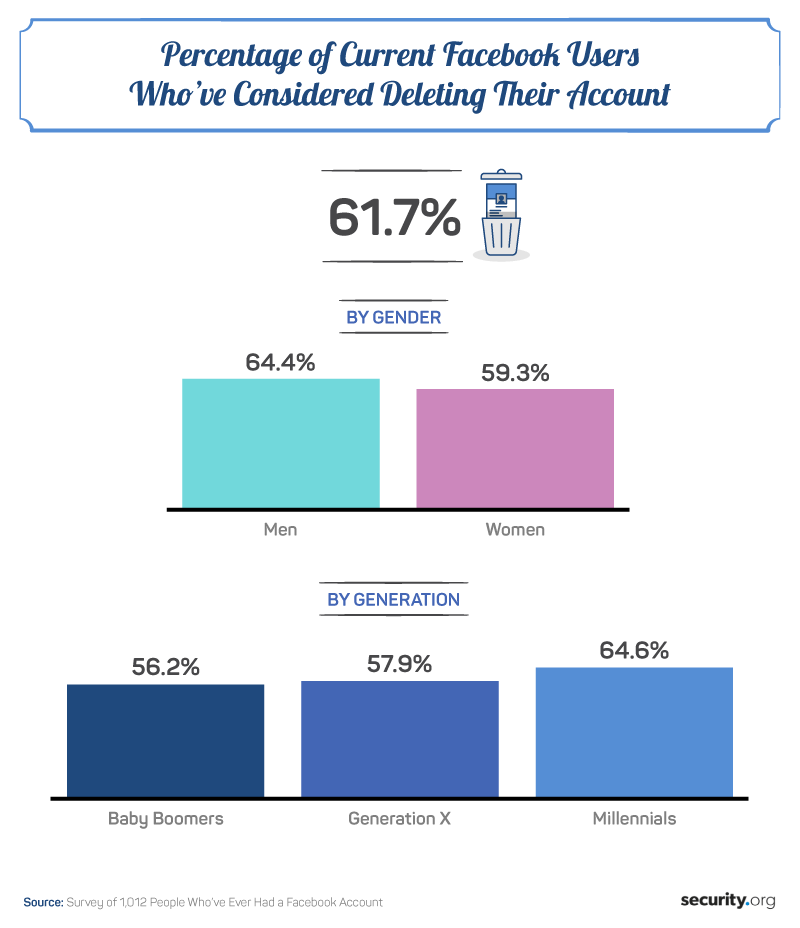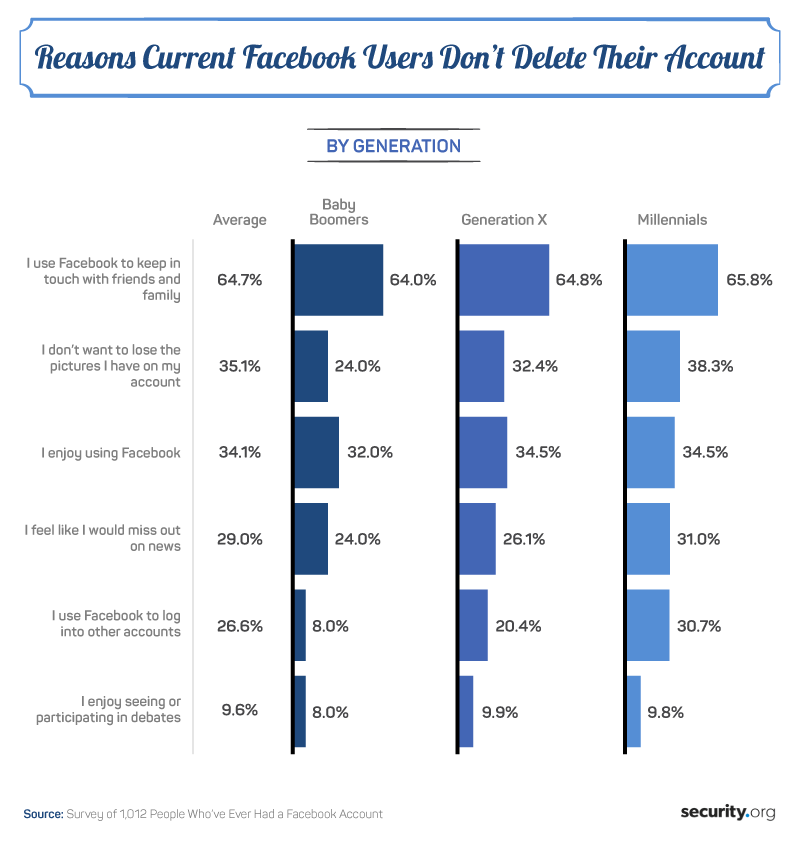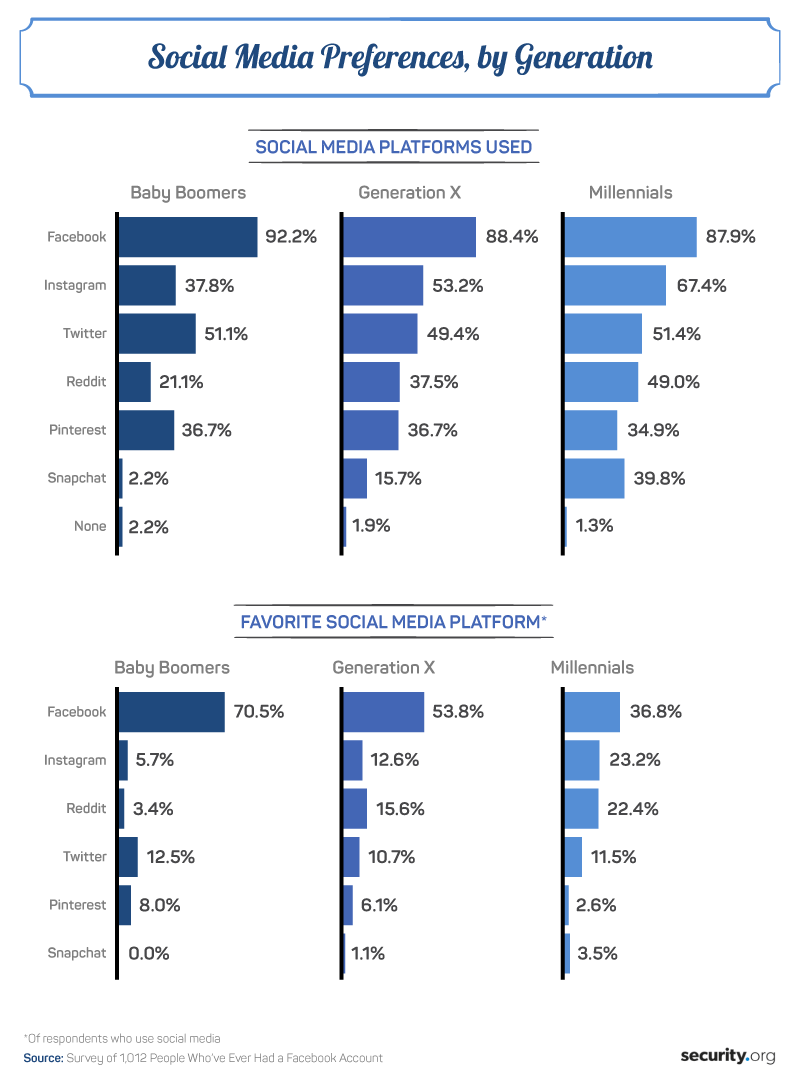Detailing the Delete Facebook Phenomenon
Facebook: A social media platform with no shortage of puppy pictures, cooking videos, and privacy scandals.
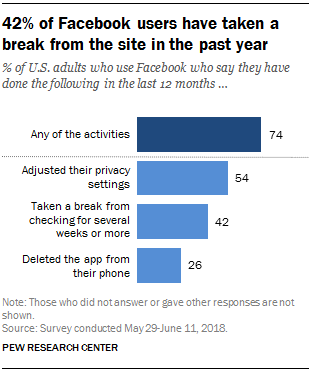
2018 was a tumultuous year for Facebook. That was when the Cambridge Analytica scandal broke out, revealing Facebook’s hand at the unconsented release of Facebook users’ to the British consulting firm.
It was never the same for Facebook after that. Research shows that after the Cambridge Analytica debacle, 3 in 4 Facebook users in 2018 made some effort to adjust their presence on the site, including 42 percent who took a break.
The Delete Facebook phenomenon is real – to delve deeper into it, we surveyed 1,000 people on the social media giant’s trustworthiness, how their life changed after deleting Facebook, and why other people just can’t give it up. Let’s take a look at their responses.
Pro Tip: To really stay on top of your identity, read the Best Identity Theft Protection Services of 2025 that we’ve personally tested.
>> Learn More: The Data Big Tech Companies Have On You
The Digital Detox
Social media has become a global phenomenon. No matter where you live or how old you are, there’s a fairly good chance you’ve come across social media. While liking and sharing are fundamental to how we interact online, several analyses show social media is still a young man’s game in some ways. Compared to 69 percent of adults across the U.S., 86 percent of adults between the ages of 18 and 29 are social media users. But, how many of these users think social media is ruining their lives?
While there’s a perception that millennials have a social media addiction, our survey shows they are the most likely to delete or deactivate their Facebook accounts. Around 9 percent of millennials have already taken the plunge and purged Facebook out of their social media rotation. In comparison, only 1 percent of baby boomers and almost 8 percent of Gen Xers have done so.
Among those who have gotten rid of Facebook, data privacy seemed to be the main driving factor. Nearly 66 percent of people who deleted Facebook did so because they didn’t want the social media platform to have their personal data. Facebook has faced its fair share of criticism these past few years, mainly because of how it shares users’ data with third-party applications. A lot of people also criticize Facebook for the amount of data it collects and how that data is being used for ad-targeting.
Another 61 percent were worried about their privacy, followed by too much unnecessary drama (58.2 percent), political arguments (43 percent), and overuse (40.5 percent). If you’re thinking about deleting Facebook over privacy concerns, make sure to check out our Identity Theft Protection Guide for more tips on protecting your privacy.
Seeing the Silver Lining
Social media isn’t all bad, but research continues to point to negative side effects that users should be aware of. The average person spends two hours every day scrolling through various social media accounts, and for some, it can encourage addictive behavior, promote stress and depression, and make it difficult to sleep. Social media platforms are also how kids cyberbully their classmates. If you want a deeper understanding of cyberbullying to protect your kids, we compiled twenty crucial statistics about cyberbullying for 2025.
On the contrary, those who made the effort to delete or deactivate Facebook reported improvements in their lives. Nearly half of them (46 percent) said they were significantly happier after getting rid of Facebook, while 41 percent said it made them slightly happier.
Ditching Facebook may also have a positive impact on romantic relationships. The people polled admitted their relationship with their significant other was better since they deleted Facebook. Because of the way we gravitate toward our phones and social media constantly, relationship experts argue that apps like Facebook can make our partners feel devalued and unappreciated.
One of the reasons we see that makes Facebook purgers happier is all the free time they now have. The average person spends nearly an hour a day on Facebook, so getting rid of it can free up one’s time. An hour per day is equivalent to more than 14 days per year. That’s a lot of time better spent doing something more productive.
The people we surveyed said that removing Facebook from their lives permitted them to do more reading, spend time with family and friends, watch TV, and exercise – instead of being hunched over their phones scrolling on Facebook.
Name Your Price
Not everyone is willing to give up Facebook – at least not without a little nudge. To see how much people value their Facebook accounts, we asked our respondents how much it would cost to get them to delete Facebook permanently. They named their price: On average, men are willing to give up Facebook for good for $1,129. The average asking price for women was nearly double that at $2,047.
There’s also a significant disparity between generations. Millennials are willing to give up Facebook for the least amount of money – just $1,468 on average. Gen X ($1,892) and baby boomers ($1,983) asked for a bit more.
Surprisingly, these numbers are pretty close to the results we got from our recent survey where we asked 3,000 Americans “How Much Would You Sell Your Social Media Data For?” We found out that the average person would sell it all for just over $2,000.
On the Fence
Many Americans don’t trust Facebook, and many people surveyed at least considered doing something about it. Parents also worry about their kids use of Facebook and other social media platforms. We found out that a staggering 89% of parents support stricter legislation to protect kids on social media.
Over 64 percent of men and 59 percent of women considered deleting Facebook, including around 56 percent of baby boomers, nearly 58 percent of Gen Xers, and almost 65 percent of millennials. It might seem like a daunting task, but deleting Facebook has plenty of benefits. Not only will you get more time back in your day, but also your communication skills, time management, motivation, and happiness may increase after a digital detox.
Finding a Use for Facebook
Most people don’t trust Facebook, and the physical and emotional benefits of purging it are fairly well-known, which can only mean that if unplugging from Facebook were easy, almost everyone would do it.
So what are holding people back from signing up for the Facebook cleanse? For nearly 2 in 3 people of all ages, the answer was simple: staying in touch. From its convenience to ease of use, there’s no denying that social media platforms like Facebook are successful communication devices and help us feel connected to friends and family all around the world.
While millennials were the most eager to get rid of Facebook for good, they were also the first to admit that losing their Facebook images encouraged them to stick around. Millennials were also more likely not to want to miss out on news and use Facebook to log into other online accounts. Only 34 percent of people acknowledged keeping their Facebook accounts active because they enjoyed using the service.
Popular Picks
Despite the controversies and doubt surrounding Facebook and its management of users’ private and sensitive data, Facebook remains the most popular social media platform. Over 92 percent of baby boomers, more than 88 percent of Gen Xers, and nearly 88 percent of millennials admitted to spending the bulk of their social media hours on Facebook compared to Instagram, Twitter, or Reddit.
Facebook also ranked as respondents’ favorite social media platform. While millennials were more inclined to have a strong affinity for Instagram and Reddit, Facebook still won out as their social media platform of choice. While nearly 71 percent of baby boomers and almost 54 percent of Gen Xers ranked Facebook as their favorite social media site, less than 37 percent of millennials said the same.
What Goes Up Must Come Down
Even after a monstrously bad year in terms of press and user trust, Facebook remains the undisputed king (or queen) of social media. Even though most people thought about deactivating their Facebook accounts, staying connected to family and friends was the biggest reason they stayed plugged in.
Just because Facebook earned the top slot among the most used and preferred social media platforms doesn’t mean its position is guaranteed forever, though. Millennials were the most likely generation to purge Facebook and do so as a result of privacy concerns. Millennials also had the least affection for Facebook, even if it still was their favorite social media platform. Considering younger generations are often the heaviest social media users, this trend among millennials could spell an uneasy road ahead if Facebook doesn’t repair the damage it caused in 2018.
Methodology
We collected survey responses from 1,012 people who have ever had a Facebook account. 47.8 percent of our participants were men, and 52.2 percent were women. Participants ranged in age from 18 to 83 with a mean of 36.4 and a standard deviation of 11.2. Anyone who never had a Facebook account was disqualified. Outliers were excluded from the analysis. We used Facebook’s Q4 earnings report to find out Facebook’s average revenue per user and its total number of monthly active users. We used these numbers, along with our data, to calculate how many monthly active users Facebook would have if no one deleted their Facebook account. We simply multiplied Facebook’s average revenue per user by the number of estimated additional monthly active users Facebook would have to estimate the revenue it could have made.
Fair Use Statement
Want to repost our content? We don’t need to make things Facebook official if you want to share the findings from our study for noncommercial purposes. Just include a link back to this page so that your readers know these results aren’t #FAKENEWS and our contributors get credit for their work.


